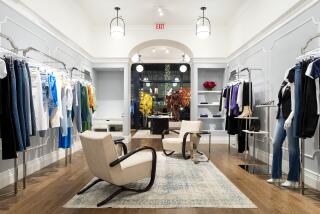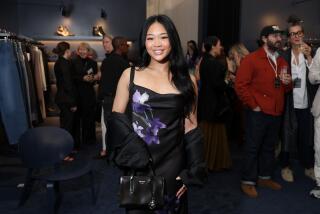Forever 21 embraces stores that seem to go on forever
Forever 21 Inc. built a retail empire by selling the latest fashion trends, but when it comes to running its own business, the Los Angeles company isn’t following the crowd.
During the recession, when Mervyns and other chains were going bankrupt and shutting stores, Forever 21 snatched them up.
At a time when competitors, worried about taking risks in a down economy, focused on basics like T-shirts and jeans, Forever 21 continued to churn out fresh and trendy merchandise.
Now as traditional big-box retailers such as Wal-Mart Stores Inc., Target Corp. and Kohl’s Corp. are opening smaller retail locations, Forever 21 is aggressively super-sizing its stores.
Its latest megastore opened last week in L.A., when the family-owned company consolidated its three Beverly Center stores into a new 45,000-square-foot space, more than doubling its presence in the mall.
The retailer also took over an 86,000-square-foot former Mervyns at Los Cerritos Center last year and a 91,000-square-foot location in Times Square in New York. Its new Las Vegas flagship is 127,000 square feet, about the size of an average Target, and in September, it will open a store in Mission Viejo in a building previously occupied by Saks. Its biggest store, at 150,000 square feet, opened last month at a shuttered Gottschalks location in Fresno.
With spaces that large, Forever 21 is moving into unknown territory for a cheap-chic retailer: No longer relegated to the cluttered-and-cramped feel of many of its smaller stores, the company is bringing its rapidly changing merchandise into huge spaces typically associated with department stores.
And with a growing lineup of categories — maternity, plus sizes, cosmetics, children’s, swimwear and shoes among them — all sold at bargain-basement prices, retail analysts say the retailer is shaking up and redefining the traditional mall anchor concept.
But is bigger better? Retail experts aren’t sure.
“Do I normally advise my clients to expand? No. But in times like this, if you have good reason to expand, then I think you take advantage,” said Marshal Cohen, chief industry analyst at NPD Group. But “they’ve got to be careful that they don’t get too big.”
Forever 21 is “almost taking a mini, hipper department store approach,” said Christine Chen, a retail analyst at Needham & Co.
“The question really is, how sustainable is what they’re doing?” she said. “They have defied odds and skepticism, but going forward they have all these really large locations. As they go into more and more markets and become more ubiquitous, does the coolness factor at some point in time go away?”
For now, shoppers say they can’t get enough of the chain’s prices and selection.
More than 300 shoppers turned out at the Beverly Center on Saturday before the store’s 10 a.m. grand opening, queuing up in a line that stretched through the food court and out onto the terrace. It was an eclectic crowd made up of young and old shoppers, teenagers, mothers pushing strollers, tourists, children, older customers and luxury shoppers toting Louis Vuitton handbags. The earliest shoppers, a family from Bell, had arrived shortly after midnight.
“In this economy, it’s the best bet to be able to go shopping and not break the bank,” said Lisa Cullen, 27, a bartender from Hollywood. “You can come every other day and there will be something new.”
The opening also attracted some first-timers such as Nick James, 28, a model who said he hadn’t known the chain carried men’s clothing.
“I always wanted Forever 21 — I was almost jealous of my girlfriend when she had so many options to choose from,” he said. “It’s like disposable fashion.”
The bigger stores have generated a lot of buzz, but they’ve also translated into increased business, President Alex Ok said. With more room for varied styles, shoppers are spending more time and money in the larger stores; the company is also seeing a wider clientele.
“People used to say we were a two-generation store, now we’re a three-generation store,” Ok said.
With its relocation, Forever 21 became the fourth-largest store in the Beverly Center, behind anchors Bloomingdale’s, Macy’s and Macy’s Men’s, said Jefferson Brown, the mall’s general manager.
Forever 21 was founded by Do Won and Jin Sook Chang, South Korean immigrants who opened their first store in L.A.’s Highland Park neighborhood in 1984.
Today the privately held company, which is headquartered just south of downtown L.A., has 481 stores in eight countries — 100 of them in California — and more than 33,000 employees. Besides opening giant stores, it is working on an aggressive expansion in Europe. About 70 locations are expected to open worldwide this year.
In 2009, the most recent year that the company released sales figures, it reported revenue of $2.3 billion. This year Forever 21, which said a stock offering isn’t likely anytime soon, is projecting revenue of more than $3 billion.
Despite its growth, Forever 21 has largely remained a family enterprise, with Do Won Chang running the business as chief executive and his wife in charge of merchandising. A couple of years ago, the couple’s daughters joined the business. Linda, 29, runs the marketing department and Esther, 24, spearheads visuals such as store displays and window design.
On the morning of the Beverly Center opening, the Chang sisters, bleary-eyed from working through the night, gave a tour of the two-level store, which includes expanded shoes and lingerie sections as well as a dedicated area for gifts such as key chains, ear buds, cellphone covers, notebooks and candy.
“This is a Swedish summer concept. It’s unique only to this store,” Esther says, sweeping her arm out toward racks of floral-print dresses, high-waisted shorts and flowy tops. “This is called ‘glamazon,’ it’s more for the girl who wants to be a little bit sexy, who’s very Kim Kardashian-inspired.... This is our Lolita section: We have little polka dots, we have stripes, we have hearts, it’s supposed to be kind of like that Bettie Page look.”
It’s a dizzying assortment of fashion styles, made all the more impressive by the fact that nothing in the store costs more than $52 (for a men’s jacket) and by how quickly the company is able to whip up new merchandise.
“It’s all about keeping your eye out on the street, traveling, magazines. Inspiration comes from everywhere,” Linda said. “And now with the Internet, it’s easy to identify trends really quickly.”
But Forever 21 has also been dogged for years by accusations that it is copying designer labels and manufacturing poorly made knockoffs for cheap overseas. Dozens of trademark and copyright infringement lawsuits have been filed against the company, which said it has never been found liable; it has settled some of the suits out of court.
Linda acknowledged that the company has faced criticism, but noted that the company was “doing a lot more legal compliance” and making sure its vendors were aware of the problem.
“We have millions of styles, and it’s something that’s kind of hard to control,” she said. “But I think in recent years, people would say there has been a marked difference and that we have been putting it as a priority.”
But Christian Avila of Hacienda Heights, who was keeping his girlfriend company at the Beverly Center opening, said he preferred more original looks. “They’re all right; not necessarily my style,” the 19-year-old said of Forever 21. “To be honest, I don’t want to be wearing something I know everyone is wearing.”
Forever 21’s entry into large stores is injecting some excitement into malls, analysts say, noting that traditional department stores in particular have become boring for many shoppers. But competition is stiff in the fast-fashion world, with rivals H&M, Zara, Wet Seal and Charlotte Russe all vying for the same customers.
As she rode Forever 21’s in-store escalator up to the second floor, hip-hop music blaring and throngs of customers angling to get inside, Linda Chang said she was confident Forever 21 could handle the competition and the large spaces.
“We’re not going to stop and look back,” she said. “Yes, we’ve had explosive growth, but we’ve been around for a while and we’re prepped for this.”
More to Read
Inside the business of entertainment
The Wide Shot brings you news, analysis and insights on everything from streaming wars to production — and what it all means for the future.
You may occasionally receive promotional content from the Los Angeles Times.










